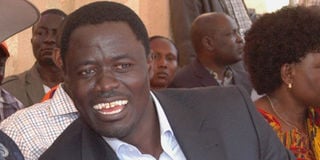Premium
Kaluma’s strange legal proposals

Homa-Bay town MP Peter Opondo Kaluma.
Homa Bay Town MP George Peter Opondo Kaluma is an interesting man, one worth a mention or two in the annals of Kenya’s Legislature.
He is a man of original ideas, one who does not hesitate to defend them to the hilt even if the whole world opposes them, and one who is not averse to controversy even if he knows for sure that he may be wrong.
In short, Mr Kaluma is a politician who does not tip-toe around issues, and when there is a backlash, he rides the waves of negative enthusiasm and then disappears. As such, he is a breath of fresh air in our stuffy Legislature.
What is even more intriguing is that in some cases, the man seems to be merely content with making a statement.
At the moment, one of his recent Bills is at the public participation stage during which stakeholders are expected to submit their views to the Justice and Legal Affairs Committee of Parliament.
He seeks to amend the Anti-Corruption and Economic Crimes Act of 2003 by deleting Section 64 of Chapter Six which bars corruption and economic crimes convicts from holding public office for 10 years.
This week, the Ethics and Anti-Corruption Commission came out guns blazing, accusing the MP of attempting to scuttle the entire Leadership and Integrity Act leading to gross impunity.
So did the Attorney-General, the Law Society of Kenya, and a few other lobby groups. What Mr Kaluma, an erudite lawyer sought to achieve with this reactionary piece of legislation remains a mystery unless he is planning to do something indictable in the near future, in which case he would be justified in seeking to protect thieves and other ne’er-do-wells who teem in high office. In any case, the ban is not infinite, which makes the Bill rather futile.
In 2017, with the support of a few other so-called public intellectuals, Mr Kaluma promoted the idea of dividing Kenya into two countries, saying the secession of 40 out of 47 counties was the only way to get electoral and economic justice.
Aggrieved at the contentious election outcome that year, he went as far as drafting a Bill to that effect, leaving the Mt Kenya counties marooned in the middle.
Apparently, the attempt never went anywhere, but recently, there has again been talk about secession, this time against the Kenya Kwanza government, and seemingly, he is still in the thick of it.
Even more dramatically, the man has been involved in the promotion of a Bill which may enjoy massive public approval because Africans in general abhor any form of sexual aberration.
However, whether his Family Protection Bill, which is actually an anti-gay law, will pass as intended is another issue altogether considering that African countries are under great pressure from Western countries to adopt a more liberal attitude towards uncommon sexual orientations.
The Bill seeks to ban homosexuality, same-sex marriage, the promotion of LGBTQ+ activities. It closely resembles the anti-gay law enacted in Uganda with penalties that may include capital punishment.
If passed by Parliament, then the spread of homosexuality in Kenya will abruptly grind into a halt or it will plunge into the underground and thrive.
* * * *
When recently I came across the term “indigenous peoples” in a news item, my curiosity was piqued.
The last time I heard the phrase used to describe some ethnic communities in Kenya was in the 1990s when the burly political heavyweight and ethnic chauvinist, William ole Ntimama, occasionally jetted off to represent the Maa and related communities at periodic conferences organised by the United Nations.
He never revealed what was discussed there, which is a pity. Now it turns out that a lobby, the African Region Indigenous People (Arip), wants to play a role in the COP28 climate talks in Dubai this November. Can’t wait to hear what these guys will say.
But who are these people? Apparently they are those native to a specific region having lived there before other Africans and colonists settled there, and in Kenya they mostly include the Maasai and other warring pastoral tribes like the Turkana and Samburu, as well as forest dwellers like the Ogiek.
In central Africa, the Pygmies qualify for this classification, in southern Africa, the Bushmen (San), and in western Africa, the Fulani.
The one thing these people have in common is that most have been left behind by civilisation due to historical neglect. They have lost most their original land, and a number are on the verge of extinction.
Nevertheless, the continued use of the term “indigenous” does leave one feeling uneasy for it sounds extremely patronising, much like the word “native” to describe Africans in general during the colonial times turned out to be a pejorative.
Maybe the clever people in the United Nations should coin another word or phrase to describe the “hunter-gatherer” peoples for two reasons: Most communities in the continent migrated from elsewhere, and secondly, classifying some as indigenous is tantamount to depicting them as anthropological curiosities whose role is to hop around for the amusement of jaded Western capitalists on the tour circuit.
- Mr Ngwiri is a consultant editor; [email protected].





